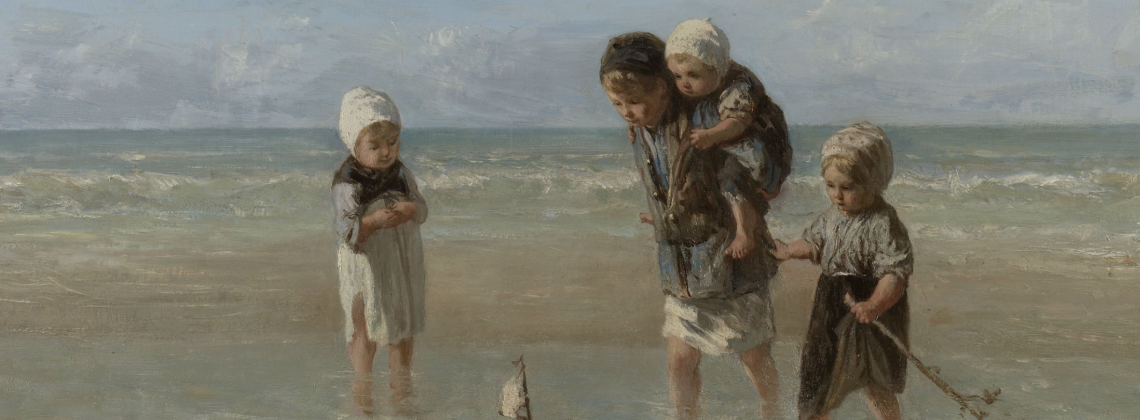

The reasons for having children are self-explanatory. Why are we rejecting them?
Hannah’s Children: The Women Quietly Defying the Birth Dearth by Catherine Pakaluk. Regnery Publishing, 2024. 256 pp, $29.99.
Once while visiting a museum exhibit on important twentieth-century inventions, I saw a smartly dressed middle-aged woman standing in front of a panel on the birth-control pill. A man of similar age walked by and exclaimed aloud, in the direction of the woman already reading about birth control, “Wow, what a great thing that was, not to have to have so many kids! For women not to have to keep having babies but plan their lives!” The woman wheeled around to him and demanded, “You know what you’re saying? You’re saying those people shouldn’t exist! You’re saying kids in large families never should have been born!” Unable to find a suitable answer, the poor man slunk around the corner.
The conclusion of Catholic University economist Catherine Pakaluk’s Hannah’s Children: The Women Quietly Defying the Birth Dearth is that women who have many kids may be happier than others. The joy of big households tips the hand of birth-control boosters who don’t shy from expressing their disapproval. But as one Pakaluk interviewee quips, her mother rebuffed disapproval of her own large brood by asking, “Well, which one should I give back?”
As pressing population concerns shift from the “bomb” Paul Ehrlich predicted in the 1960s to the “birth dearth” Ben Wattenberg foretold in the 1980s, political and economic analysts worry about falling fertility rates. Interviewing fifty-five women with five or more kids, Pakaluk applauds those with large families.
Despite the book’s title, these women are not quiet. They give long responses the author reproduces at length. They are a diverse group, conspicuously studded with advanced degrees, PhDs and MDs enough to startle readers who might prejudge these teeming, breeding females as witless and shoeless. Pakaluk shows that these families are doing well, with strong marriages and felt abundance even amidst modest means. Their choice to have many babies deserves respect just as much as others’ choices to have high-powered jobs or Caribbean vacations.
The households she profiles are busy, jolly places—a self-conscious rebuff to reams of recent complaints about how dreary parenting is, and how much righteous rage moms harbor. Pakaluk’s crowd admits that childrearing is real work; they want to do it anyway. As in many books about motherhood, the children themselves are rather abstract, one baby appearing after another, each as precious and sweet as the last and nearly indistinguishable. Thus readers may be surprised near the end of the book to discover how much is riding on these actual children. They are future earners and taxpayers, characters more mature and resourceful than small-family offspring plagued by mental ill-health and selfishness from scarcity of siblings. Big families practically seem poised to save civilization.
Pakaluk’s women do not fit stereotypes linked to moms-of-many, though they do not exactly overturn them either. Their marriages lean traditional. Most have strong religious commitments and explain their motherhood as obedience or openness to God’s plans. Indeed, Pakaluk concludes that at the end of the day, religion might be “the only effective family policy.”
At the same time, Pakaluk’s mothers behave as rational choosers. They do not blunder into motherhood or fail to count the costs, the lost opportunities, and trade-offs that having many children entails. They go ahead and choose babies because they have decided that having babies is more worthwhile than any competing goods. These moms have kids because they want them, which Pakaluk shows will be good for the economy. Readers might find it satisfying that choices made for personal desire have public benefit—though I prefer a vision of the commonweal over sleights of invisible hand.
This book echoes a chorus of recent writers arguing that because marriage and childrearing advance happiness, Americans should “defy” elites and do these things. Pakaluk shares this approach with Brad Wilcox’s Get Married: Why Americans Must Defy the Elites, Forge Strong Families, and Save Civilization and Timothy Carney’s Family Unfriendly: How Our Culture Made Raising Children Much Harder than It Needs to Be. Notwithstanding the elite degrees and jobs these writers themselves hold, defiance is the wind in their sails.
And yet, Pakaluk’s place on Team Defiance stirs my disquiet. Hannah’s Children is an appealing book in many respects. It praises mothers and commends family as a sphere of vocation. On many points I agree with the author: having children is good; it is good for kids to have siblings; pro-natalist policies like tax credits and child subsidies fall short by misperceiving why people have children. And yet I kept turning this book’s pages because they made me itchy, and I reached the end unsettled by the mismatch between my general agreement and my irritation with it.
Perhaps my disquiet is that the book leans in the direction of a taunt. For a while the author presents her interviewees simply as those who have made a legitimate, even beautiful, choice. But, as in late twentieth-century “mommy wars,” where working moms and stay-at-home moms felt obligated to anathematize each other because one’s way of life implied judgment of the other, observers of these bountiful women can hardly stay neutral.
Pakaluk showcases interviewees effectively saying that motherhood fulfills a woman’s purpose (“God created me a woman to have babies . . . I am made to have babies”) or lets them find themselves (“my identity is totally changed, I’m a mom, like that’s who I am. That’s what I do”). Here women just seem to crave babies, like the mom who turned to her husband after birthing their ninth and asked how many more she could have. To be fair, these words come from the interviewees and not the author herself. Nevertheless, it is hard not to draw the gist that women should not bother with all that other stuff, like becoming doctors or presidents, because what they are really good at is motherhood and they will like that better anyway.
Still, the blame for this defiance might finally lie not with Pakaluk but our society. Having disconnected sex from fertility, love from marriage, and children from family life, such overstatements as those seen in the book become nearly obligatory in reply.
In the twentieth century, Planned Parenthood popularized the slogan, “Every child a wanted child.” Presuppositions then held that biology could yield too many children and at the wrong time, even as, in general, people wanted children. Now pro-natalists work hard to persuade some people even to want them. In some places it still is the case that having fewer children can help improve women’s health and security. The fact that the birth dearth is a problem in some parts of the world does not overturn the fact that the earth shudders under us billions. We make a malapportioned use of its resources, and our offspring will reap some whirlwind. There are plausible reasons for being less than glad to have a baby on the way, like health, survival, or scarcity, but those are obstacles to a warm welcome rather than arguments against new life.
Emphasizing parental preference and endorsing baby-making on grounds that one wants children, though, risks overreach. Having children because you want some is not a good reason. That one person should exist because another decided in advance to want him is no just precondition to lay on another’s being.
If having children because one likes kids or just wants them are not good reasons, what is a good reason? To begin to list the reasons in favor of having a baby feels idiotic, like trying to explain why sunshine is nice or puppies are cute. The reasons in favor are self-explanatory—newness; hope; another soul; arrival of a person never seen before in the universe; someone to love who loves back; embodiment of the love parents have for each other; braid of ancestry and posterity. In most places and most times, no argument need be made in favor of children.
Kids are people, after all.
I have never understood what people mean when they say they “like children” or “don’t like children.” They might like or not like particular children, or particular features of juvenile pop culture. Raising children can be hard—not just because children make a lot of messes and a lot of laundry, but because they are as complex, unpredictable, aspiring, and free as the moms and dads who have them. To not like children is to not like people, and to not like people is to reject the good of created beings—indeed, even to reject oneself.
Of course people should want children. Each child is such a profound mystery that neither triumph nor defiance serves well to explain that existence. A tangle of reasons ties parents’ private decisions with public priorities to bring about the birth of any of us. Pakaluk’s own explanation for her choice of many children might serve as a banner over Mother’s Day. “The capacity to conceive children, to receive them into my arms, to take them home, to dwell with them in love, to sacrifice for them as they grow, and to delight in them as the Lord delights in us” may indeed be, as she declares, “the most worthwhile thing in the world.”
Agnes R. Howard teaches in Christ College, the honors college at Valparaiso University, and is author of Showing: What Pregnancy Tells Us about Being Human. She is a Contributing Editor for Current.
Jozef Israëls, ‘Children of the Sea,’ 1872, Rijksmuseum